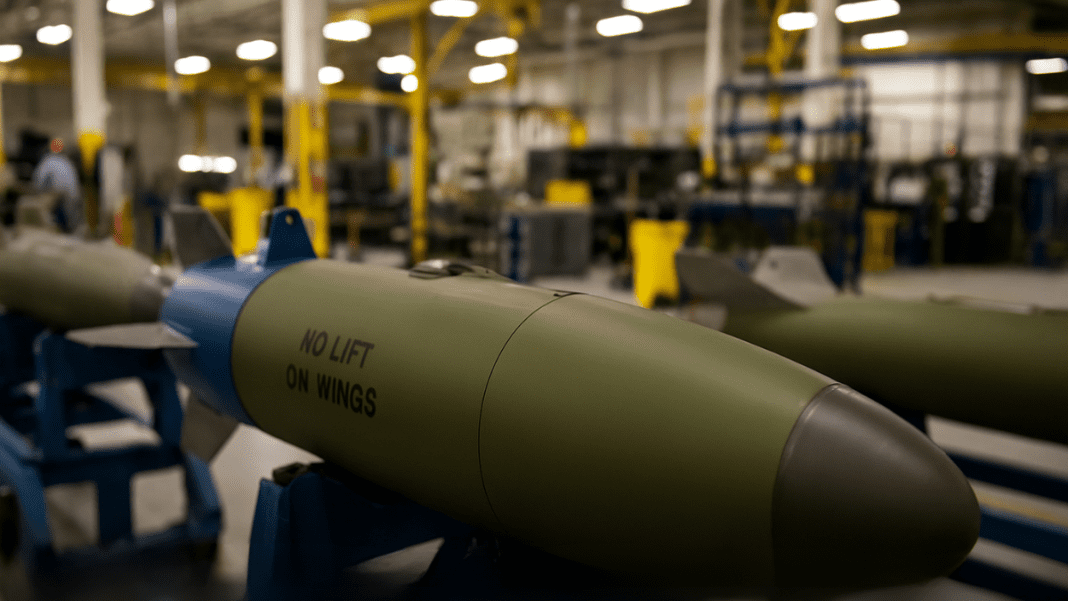A major European missile manufacturer, MBDA, supplies critical components used in bombs that Israeli forces have dropped on Gaza, causing the deaths of children and other civilians. MBDA, Europe’s largest missile maker, produces specialized wing systems that guide bombs to their targets.
MBDA Components Found in Bombs Used on Civilian Sites in Gaza
A factory in Alabama, USA, manufactures these components, and technicians install them on the GBU-39 bomb, a guided weapon made by Boeing.
The U.S. government delivers these bombs to Israel as part of its military aid. Open-source investigators and weapons experts have verified that Israeli forces used the GBU-39 bomb in at least 24 attacks between January and May 2024. These attacks reportedly killed civilians, including children. Most of the strikes targeted schools and tent camps where families displaced by the conflict were sheltering.
Many of these bombings occurred during the night without warning. Survivors have described scenes of chaos, fire, and destruction. In several cases, local authorities and humanitarian groups documented that children were among the dead. The use of bombs in civilian areas has drawn international criticism, with some organizations suggesting that these actions could constitute violations of international humanitarian law.
🚨Israel unleashes wave of strikes on Syria as Druse crisis spins out of control
Despite the mounting evidence, MBDA confirmed it continues to supply the wings used in these bombs through its U.S.-based operations. Profits from this subsidiary flow into MBDA UK and are eventually passed on to the main group, which is jointly owned by major European defense companies. In 2023, MBDA distributed £350 million in dividends to its shareholders.
Legal Loopholes Allow MBDA to Continue Supplying Bomb Parts
The UK government has partially suspended some weapons exports to Israel due to concerns about serious violations of international law. However, this move has several limitations. The restrictions apply only to items directly exported from Britain. MBDA’s U.S. operations are not subject to UK laws, and they remain free to supply components to Boeing in America.
Because MBDA Inc. is incorporated and operates in the United States, it is governed by American regulations. This allows the company to continue its operations unaffected by UK export license suspensions. Experts have pointed out that such legal structures can allow European arms companies to indirectly support warfare, even when home governments attempt to limit involvement.
Israel’s Humanitarian Strategy in Gaza Under Fire from UK, France, Canada and Aid Groups
Weapons specialists say the wings made by MBDA are essential for the functionality of the GBU-39. These wings enable the bomb to fly accurately over long distances after fighter jets release it. Investigators have found fragments of these components at several bombing sites in Gaza. In some of the most severe attacks, they identified remnants of MBDA-manufactured parts at locations where the blasts killed dozens of civilians.
The bombs themselves have a relatively small explosive charge compared to larger weapons, but they are still deadly in enclosed spaces. In schools and homes, they can start fires and cause structures to collapse. The verified attacks using these bombs have claimed the lives of over 500 people, including more than 100 children.
MBDA’s Role Under International Scrutiny for Civilian Harm
The repeated use of the GBU-39 bomb in densely populated areas, especially in places where civilians are known to be taking shelter, has attracted international scrutiny. Humanitarian organizations and the United Nations have flagged several of the attacks for possible investigation under international law. Some experts argue that these bombings may fall under the category of war crimes due to the lack of precautions to avoid civilian harm.
In one case, a nighttime airstrike hit a school in Gaza City that families were using as a shelter, killing dozens, including many children. Witnesses reported that no one gave any warning before the strike. In another devastating incident, military forces bombed a refugee camp in Rafah, igniting tents and causing mass casualties, including the deaths of women and toddlers. Investigators found fragments from the GBU-39 bomb at both scenes.
Violent Gaza Conflict: The Spiralling War Between Israel and Its Enemies
Despite these reports, the defense companies involved, including MBDA, have maintained that they operate within the bounds of international laws. Their marketing materials describe the wing system as a “key component” of the bomb. However, there is no public record of MBDA Inc.’s financials, making it difficult to trace the full scale of profits related to these sales.
While governments have taken some steps to regulate arms exports, critics say that more must be done to ensure companies are not profiting from the destruction of civilian lives. Human rights frameworks suggest that companies should regularly review their operations for human rights risks, especially in war zones. MBDA’s internal code of ethics acknowledges these responsibilities, though the company has not indicated whether it plans to reevaluate its U.S. operations or its role in the supply chain.
